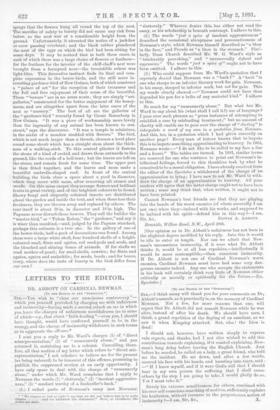LETTERS TO THE EDITOR.
DR. ABBOTT ON CARDINAL NEWMAN.
[TO TER EDITOR OF Tug " SFECTATOR."] Sin,-.—You wish to "close our unwelcome controversy "- which you yourself provoked by charging me with unfairness and insincerity—having made a second attack on me in which you leave the charges of unfairness unwithdrawn (as to some of which—e.g, that about "faith-healing "—even you, I should have thought, would have confessed yourself to be in the wrong), and the charge of insincerity withdrawn in such terms as to aggravate the offence.* I sent you a reply to Mr. Ward's charges (1) of "direct misrepresentation," (2) of "unmannerly abuse;" and you returned it, restricting me to a column. Cancelling, there- fore, all that section of my letter which refers to "direct mis- representation," I ask scholars to believe me for the present (as being unheard) to be innocent of this offence, promising to publish the suppressed section at an early opportunity. I have only space to deal with the charge of "unmannerly abuse," under which Mr. Ward complains that I apply to Newman the words (1) "slatternly," (2) "insolent aggressive- ness," (3) " conduct worthy of a bookseller's hack."
(1.) I called parts of Newman's essay (not Newman) • "We euppose we hod no Hula to Ely that we did not believe him to be quite sincere and ye withdraw the statement." Hero, as elsewhere, the italics are mine. "slatternly." Whoever denies this, has either not read the essay, or his scholarship is beneath contempt. I adhere to this..
(2.) The words "just a spice of insolent aggressiveness" described the occasional abruptness and provocativeness a Newman's style, which Newman himself described as "a blow in the face," and Fronde as "a blow in the stomach." Sim!-- larly, Dean Church described Mr. W. G. Ward's style as "intolerably provoking," and "unreservedly defiant and aggressive." The words "just a spice of" ought not to have been omitted. I adhere to this.
(3.) Who could suppose from Mr. Ward's quotation that I expressly denied that Newman was a "hack F" A "back "is one who stoops to an inferior literary work for gain. Newman, in his essay, stooped to inferior work, but not for gain. This, my words clearly showed. :—" Newman could not have thus degraded his pen for a bribe of any material kind." I adhere to this.
So much for my "unmannerly abuse." But what has Mr. Ward to say about his (what shall I call it P) use of language ? I pass over such phrases as "gross instances of attempting to establish a case by misleading treatment ;" but no amount of charity will enable me to pass over the charge of "electing" to interpolate a word of my own in a quotation front Newman. And this, too, in a quotation which I had given correctly on another page I Every man of letters knows that to impute. this is to impute something approximating to knavery. In 1864, Newman wrote :—" I do not like to be called to my face a liar and a knave." The tables are turned. In 1891, similar terms are reserved for one who ventures to point out Newman's in- tellectual failings, forced to this thankless task by what he conceived to be a moral obligation. I have already received from the editor of the Spectator a withdrawal of the charge of am approximation to lying; I have now to ask Mr. Ward to with- draw the charge of an approximation to knavery. All your readers will agree that the latter charge ought not to have been written ; some may think that, when written, it ought not to have been printed.
Cannot Newman's best Mends see that they are playing into the hands of his worst enemies (of whom assuredly I am not one) when they—imbued with his works, and supposed to be imbued with his spirit—defend him in this way P—I am, Braeside, Willow Road, N. W., April 211th.
[Our opinion as to Dr. Abbott's unfairness has not been in the slightest degree modified by his reply. Into this it would be idle to enter at length. Nor can we admit that New- man's unconscious insincerity, if it were what Dr. Abbott thinks it, would be at all less repulsive,—intellectually it would be more contemptible,—than conscious insincerity. If Dr. Abbott is not one of Cardinal Newman's worst enemies, Cardinal Newman must have had some very dan- gerous enemies indeed. Any one who accepts the statements in his book will certainly think very little of Newman either critically or morally or spiritually for the future.—En. Spectator.]






































 Previous page
Previous page